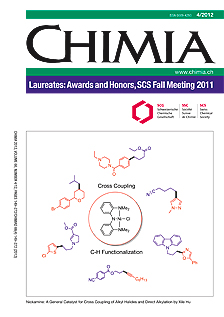In vivo Evaluation of FimH Antagonists – A Novel Class of Antimicrobials for the Treatment of Urinary Tract Infection
DOI:
https://doi.org/10.2533/chimia.2012.166Keywords:
Fimh antagonists, α-d-mannopyranoside, Type 1 pili, Urinary tract infection (uti), Uropathogenic escherichia coli (upec)Abstract
The discovery of antimicrobials as ?-lactam antibiotics or aminoglycosides revolutionized the treatment of infectious diseases. However, the extensive use rapidly created the problem of resistant pathogens, which are increasingly difficult to treat. FimH antagonists are a new class of antimicrobials, which target the bacterial adhesion to urothelial cells, a crucial first step in the establishment of urinary tract infections. Because of their different mode of action, FimH antagonists neither kill nor inhibit the growth of bacteria, they should have a reduced potential to generate resistant strains. This mini-review outlines the main problems associated with increasing development of antimicrobial resistance. Furthermore, it summarizes the currently available in vivo studies in mice for the treatment of urinary tract infections conducted with FimH antagonists.Downloads
Published
2012-04-25
Issue
Section
Scientific Articles
License
Copyright (c) 2012 Swiss Chemical Society

This work is licensed under a Creative Commons Attribution-NonCommercial 4.0 International License.
How to Cite
[1]
Chimia 2012, 66, 166, DOI: 10.2533/chimia.2012.166.







